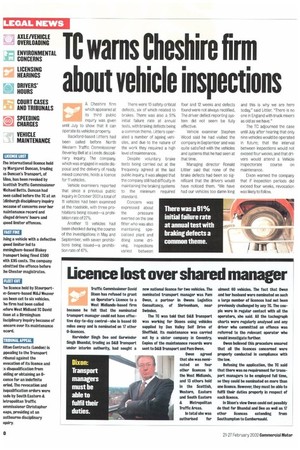TC warns Cheshire firm about vehicle inspections
Page 20

If you've noticed an error in this article please click here to report it so we can fix it.
Cheshire firm wnich appeared at ts third public ,nquiry was given until July to show that it can operate its vehicles properly.
Backford-based Littlers had been called before North Western Traffic Commissioner Beverley Bell at a Leeds disciplinary inquiry. The company, which was engaged in waste disposal and the delivery of ready mixed concrete, holds a licence for 11 vehicles.
Vehicle examiners reported that since a previous public inquiry in October 2001a total of 11 vehicles had been examined at the roadside, with three prohibitions being issued—a prohibition rate of 27%.
Another 15 vehicles had been checked during the course of the investigations in May and September, with seven prohibitions being issued—a prohibition rate of 47%. There were 10 safety-critical defects, six of which related to brakes. There was also a 91% initial failure rate at annual tests, with braking defects being a common theme. Littlers operated a number of ageing vehicles, and due to the nature of the work they required a high level of maintenance.
Despite voluntary brake tests being carried out at the frequency agreed at the last public inquiry, it was alleged that the company still had difficulty in maintaining the braking systems to the minimum required standard, Concern was expressed about the pressure exerted on the one fitter who was also maintaining specialised plant and doing some driving. Inspections varied between four and 12 weeks and defects found were not always rectified. The driver defect reporting system did not seem be fully effective.
Vehicle examiner Stephen Wood said he had visited the company in September and was quite satisfied with the vehicles and systems that he had seen at that time.
Managing director Ronald Littler said that none of the brake defects had been so significant that the drivers would have noticed them. 'We have had our vehicles too damn long and this is why we are here today," said Littler. "There is no one in England with truck mixers as old as we have."
The TC adjourned the case until July after hearing that only nine vehicles would be operated in future; that the interval between inspections would not exceed four weeks; and that drivers would attend a Vehicle Inspectorate course on maintenance.
Dixon warned the company that if inspection periods did exceed four weeks, revocation was likely to follow.






















































































































































